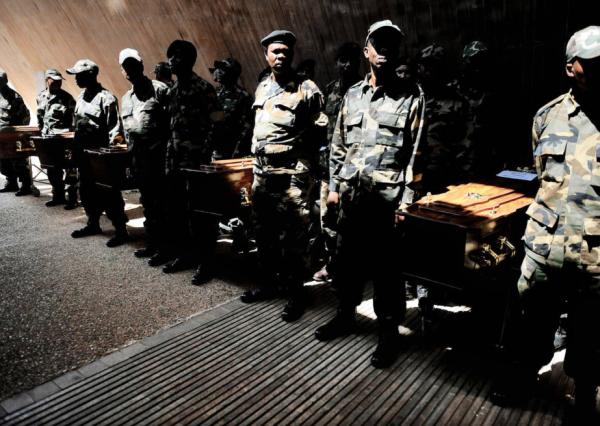
JOHANNESBURG — In the Mutale River in Venda, there is an island without a name.
REPORT BY IOL
A quarter of a century ago, a now forgotten battle took place on the island.
The battle of Mutale River isn’t written up in history books, but its traumatic events still reside in the memories of the few who survived. James Sekgale is one of them.
On March 28 1988, near the town of Thohoyandou, a firefight broke out between nine Umkhonto Wesizwe (MK) guerrillas and members of the South African Defence Force.
Five of the nine were killed in the shoot-out.
Four MK members Dan Nkabinde, Sipho Nkosi, Reuben Letsela and Oupa Lukhele who died in the Battle of Mutale 25 years ago, were honoured at the Rabasotho hall in Tembisa on Sunday.
On Sunday, three of the deceased – Oupa Lukhele, Sipho Nkosi and Daniel Nkabinde – were reburied at the Mangweni-Leleba cemetery in Tembisa.
- Chamisa under fire over US$120K donation
- Mavhunga puts DeMbare into Chibuku quarterfinals
- Pension funds bet on Cabora Bassa oilfields
- Councils defy govt fire tender directive
Keep Reading
A fourth MK soldier Reuben Letsela who died in Limpopo in 1987, was buried alongside them.
They were honoured at the Rabasotho hall in Tembisa.
Recalling that fateful day, Sekgale said: “We were special forces. They sent us to Cuba for training.”
The unit of nine MK soldiers crossed from Zimbabwe into South Africa in early March, he said. They soon ran into trouble when their guide Wellington Mabaso disappeared.
Looking for a place to rest, the unit took refuge on the island.
It wasn’t long before they were spotted by members of the Venda Defence Force. Soon reinforcements were brought in, Sekgale said.
A helicopter gunship began circling and firing on the guerrillas.
Sekgale said they tried to shoot down the helicopter but were outgunned. He had to watch his comrades fall one by one.
He was captured, but three members of the unit escaped and crossed back into Zimbabwe.
Sekgale would later escape from prison in Venda and make his way back to Zimbabwe.
But the bodies of his three fallen comrades disappeared.
“At first we didn’t suspect it, until a member of the special branch came and told us that he had died,” Sipho Sombane, a relative of Lukhele, said at the reburial.
In 1998, the Truth and Reconciliation Commission gave the families of the three guerrillas their exhumed remains.
But trauma followed when it was discovered these were not the remains of the families’ loved ones.
Years later, through studying police dockets and mortuary records, the National Prosecuting Authority’s Missing Persons Task Team was able to correctly identify the three, who had been buried in the Mbaleni cemetery in Thohoyandou.
“We have got closure on this matter,” Sombane said.










